Home » News » 2024 » December
News Brief
Dec. 4, 2024 |
By: Zamone Perez - Public News Service
Government to decide if monarchs are 'threatened'

By Zamone Perez - Public News Service
The U.S. Fish and Wildlife Service is expected to decide soon whether to list the monarch butterfly as "threatened" under the Endangered Species Act.
The designation could carry major consequences for one of the country's most recognizable insects. Monarchs are split into two colonies on either side of the Rocky Mountains and both eastern and western colonies have shrunk by more than 90%.
Rebeca Quiñonez-Piñón, monarch recovery strategist and climate resilient habitat director for the National Wildlife Federation, said if the monarch is listed, federal rules will be implemented to help monarch colonies.
"The benefit is that the Service can work on tailored rules for the species itself, which can be very specific," Quiñonez-Piñón emphasized. "To target the major needs of the monarch butterfly, to ensure that we can recover and increase the population size."
She pointed out habitat loss, pesticides and climate change are the major drivers of the monarch's decline. Monarch butterflies weigh less than a paper clip and can travel more than 3,000 miles during their migration and an estimated 40% of all monarchs in the eastern colony come from Iowa and other Midwest states.
Along with one of the longest migrations of any species, the monarch has major ecological effects.
Mary Phillips, head of native plant habitat strategy for the federation, said the health of monarch butterfly colonies often indicates the health of other pollinator populations.
"Much of the monarch habitat mirrors our native pollinator habitat as well," Phillips explained. "They're kind of the 'canary in the coal mine,' if you will, that have really flagged the significant effort of habitat loss, climate change and overall ecological ramifications of pesticide use on many of our critical insect species."
Avocado farming is a serious threat to the butterfly's winter habitats in Mexico, where thousands of acres of a monarch reserve have been deforested for avocado production. This has prompted more than two dozen environmental groups to urge the State Department to ban the import of avocados tied to deforestation.
The key to a monarch resurgence is the milkweed plant, which is the only plant monarch caterpillars are able to eat. Phillips suggested planting milkweed is one of the most helpful ways people can get involved in monarch conservation. She added do not forget the adult monarchs, too.
"The milkweed is the absolute essential plant," Phillips stressed. "If you are going to have a monarch garden, you absolutely have to put native milkweed to the area that you're in, and balance that out again with some other three-season-bloom native nectar plants."
More than 1,300 species in the United States are protected under the Endangered Species Act.
![]()






